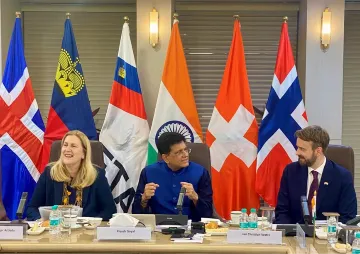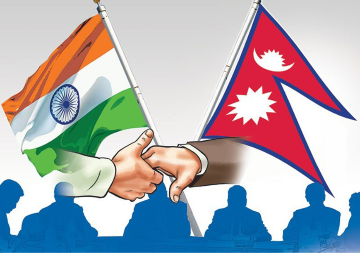Awareness and education about uncertainties — floods, droughts, etc. — should be created at the cellular level.

In the backdrop of various efforts in the past to address the critical concerns of governance of the transboundary Ganges sub-basin, the Ganga-Padma Devising Seminar was organised by Tufts’ University Water Diplomacy Programme, Observer Research Foundation, South Asia Institute of Harvard University and MIT Science Impact Collaborative Program on 10 and 11 August, 2017 in Kolkata. The Ganges sub-basin has been delineated as Ganga-Padma system in this devising seminar, which involved participants from not only the co-riparian nations of the Ganga-Padma system, viz., Bangladesh, Nepal, and India, but also experts from EU and the US. The prime objective of this devising seminar was to develop an array of actionable options (what was called
good ideas) on issues of governance, technical capabilities and policy, from informed conversations of the relevant stakeholders. Like any devising seminar, no attempt was made to obtain commitment from any participant, but intense brainstorming sessions involving technocrats, bureaucrats, diplomats, researchers, academicians, activists, NGOs, etc. working in the domain of the Ganga-Padma system generated a matrix of coordinated strategies which can result in actionable options for governance. Such an event was the first of its kind to be organised by ORF Kolkata.
A devising seminar is distinctively different from everyday academic seminars and workshops and hence the essence of the devising seminar organised, lied in the facts as follows. The most crucial aspect was that it was a confidential and informal session shielded from public scrutiny and media coverage. The facilitation of the programme was done in the most professional and skilled manner by a member not belonging to the host organisation, thus ensuring that the proceedings were just and fair and hence, only mutually agreed
good ideas were projected and no verbose speeches were made. Adequate time was provided to all the participants both before and during the seminar so that their responses were apt for the event. Lastly, the conclusion of the event saw a draft including all the actionable options which were discussed and mutually agreed upon by all the participants, presented.
The two day event was started off with a welcome address from Ashok Dhar, ORF Kolkata, followed by a special address on water programme of ORF by Sunjoy Joshi, Director of ORF, and a short description on expectations from GPDS by Shafiqul Islam, Professor and Director of Water Diplomacy, Tufts University. This was followed by an introduction of the participants hailing from revered institutions and various government organizations such as Oregon State University, International Center for Integrated Mountain Development, BRAC University, Institute for Social and Environmental Transition, IIT Guwahati, Uppsala University, International Water Association, Wright State University, Deltares, Water Conflicts, Government of Nepal and Government of West Bengal.
After the initial plenary rounds with presentations on what devising seminars are all about from experts from MIT and Harvard, the GPDS involved intense brain storming sessions in the form of round table discussions which were modeled on three broad issues of governance, technical capabilities and policy.
The discussions were focused to generate actionable options on the three time frames, which were immediate (0-5 years), intermediate (5-10 years) and long term (more than 10 years). There were four round tables of which the first three had discussions on three broad issues as mentioned above, in which each round table session was further subdivided into finer subtopics. The fourth round table acted as a summation of the first three and the participants in the three groups discussing in it, reconciled their difference of opinions and came up with mutually agreed actionable options, which were presented later. Round Table I was devised on the theme of Technical, Scientific and Engineering Issues in the Ganges Basin and participating groups discussed varying issues on the subthemes of Water Access and Allocation, Uncertainty and National Water Perspectives. Similarly for Round Table II the theme was Challenges and Opportunities around Policy Issues in the Ganges Basin and the subthemes discussed upon were Equity and Sustainability and Upstream-Downstream. Round Table III was based on the theme of Water Governance and Management of the Ganga-Padma System and was assigned the sub-themes of Cultural Issues, Spiritual Issues and Governance.
The fourth round table was devised, in a manner such that each of the individual sessions which were Technical, Policy and Governance were meant to synthesize the ideas presented in the first three round tables respectively. Hence discussions and debates were modeled in accordance to the objective of choosing three of the best ideas (actionable options) from each of the first three round tables. Thus, making the concluding draft an amalgamation of nine or ten actionable strategy options, which can be taken up by the relevant authorities. Some of the good ideas which found place in the closing draft are cited below.
A lot of stress was put on the quality and the quantity of data available and it was agreed that we should strive towards ensuring the availability of a
minimum level of data which is critical for informed decision making. Awareness and education about uncertainty (i.e. floods, droughts, etc) should be created at the cellular level by incorporating the same in academic curriculums. Policy making should follow a negotiated approach where by any policy is supported by confidence building measures at the grass root level. Strategic institutions of national importance should be set up with goals of basin level management. Lastly, considerable emphasis was put on the issue of rethinking cropping patterns and effective water demand management; so that water guzzling crops (i.e. sugarcane, boro paddy, etc) are replaced with more water efficient ones.
This report is compiled by Anupam Ghosh, Research Assistant, ORF Kolkata.
The views expressed above belong to the author(s). ORF research and analyses now available on Telegram! Click here to access our curated content — blogs, longforms and interviews.




 PREV
PREV

